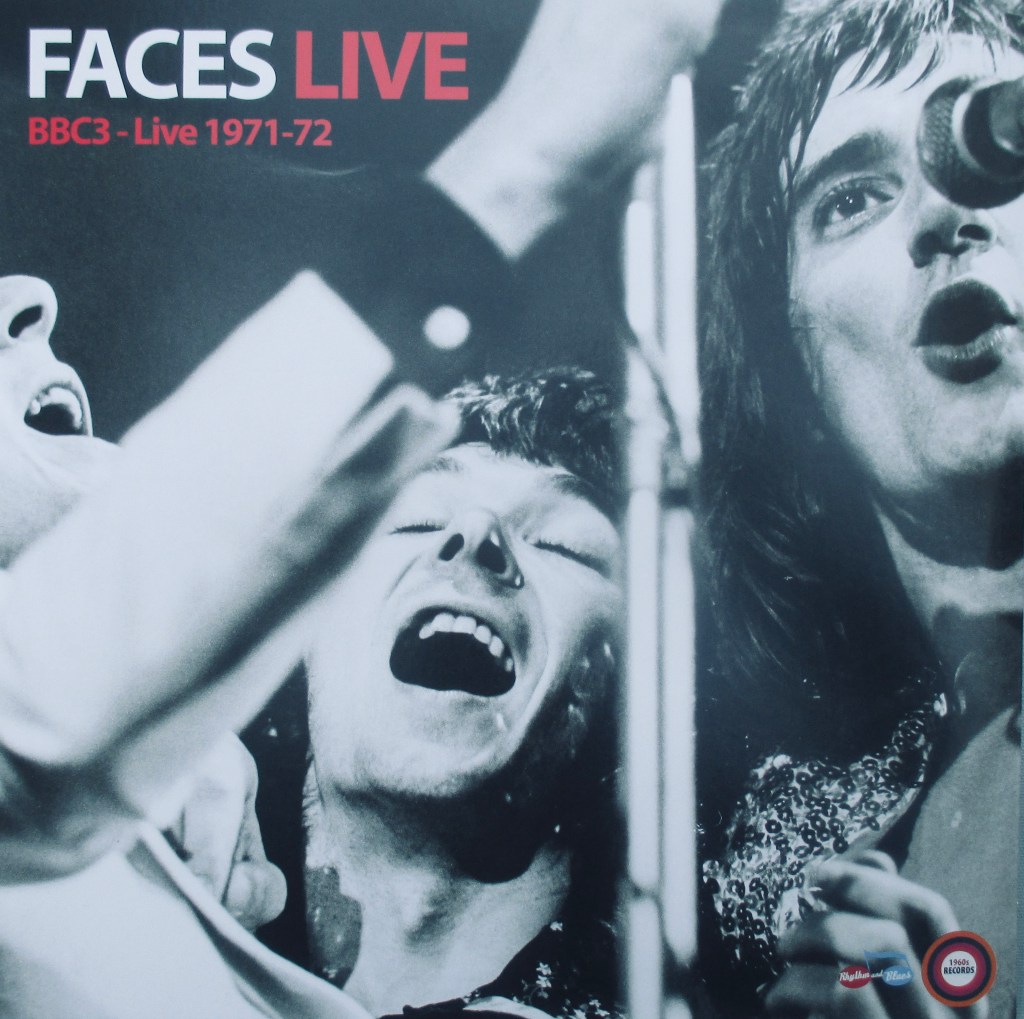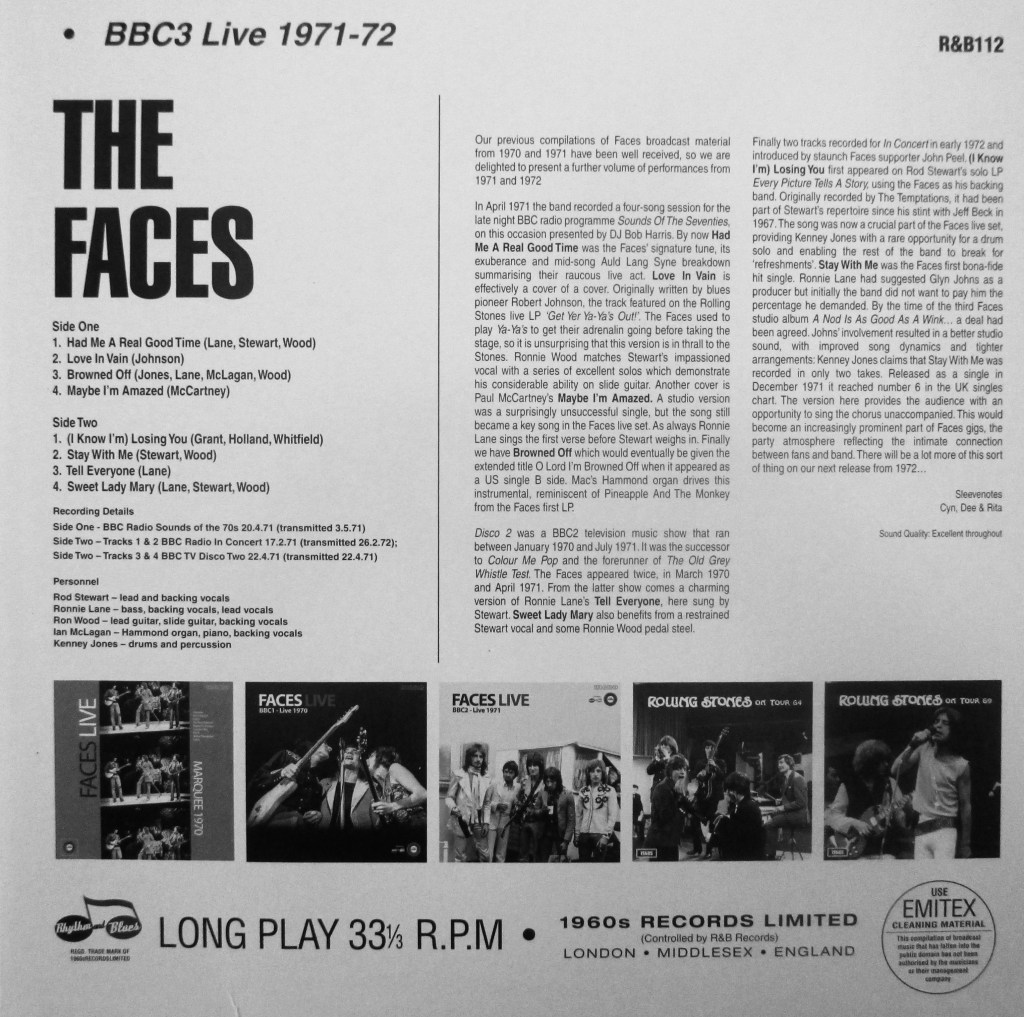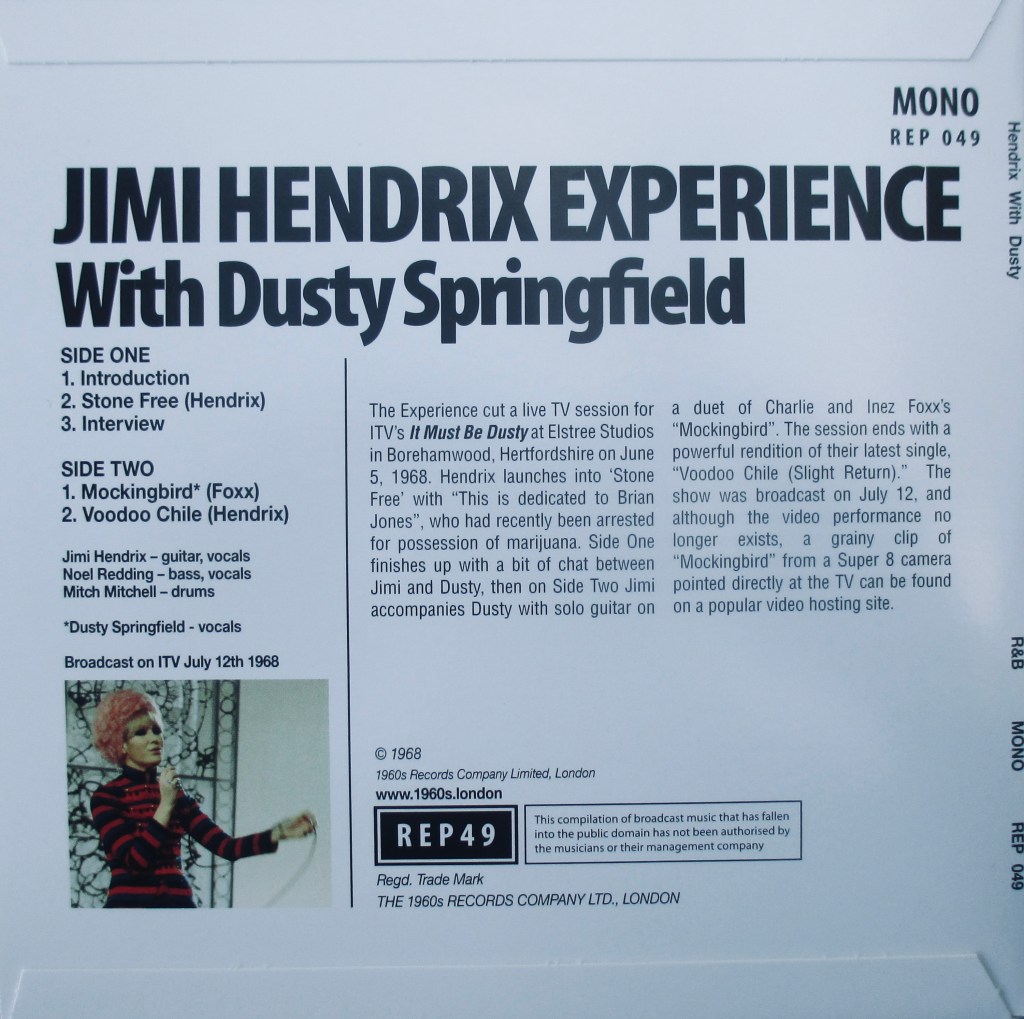New Vinyl Releases From The Rolling Stones, Faces, Family, Jimi Hendrix with Dusty Springfield
Order now from http://www.1960s.london
Rolling Stones – Live in The USA 1972

Side One
- Brown Sugar
- Bitch
- Gimme Shelter
- Happy
- Tumbling Dice
Side Two
- Sweet Virginia
- You Can’t Always Get What You Want
- All Down The Line
- Rip This Joint
- Uptight (Everything’s Alright) /
- (I Can’t Get No) Satisfaction
All songs written by Mick Jagger and Keith Richards except Side Two, Track 5 written by Stevie Wonder, Sylvia Moy and Henry Cosby
Recording Details
All tracks recorded live on tour and broadcast by Radio WMMS (Cleveland) on August 11th 1972
Side One
Tracks 1- 3 and 5 Spectrum Sports Arena, Philadelphia – 20th July
Track 4 Tarant Convention Centre, Fort Worth, Texas – 24th June, First Show
Side Two
Track 1 Spectrum Sports Arena, Philadelphia – 21st July, First Show
Tracks 2 & 3 Hofheinz Pavilion, Houston , Texas 25th June, First Show
Track 4 Tarant Convention Centre, Fort Worth, Texas 24th June, First Show
Tracks 5 & 6 Spectrum Sports Arena, Philadelphia – 20th July
Sound Quality
Excellent throughout, Side Two, Track 6 is Very Good
Personnel
Mick Jagger: vocals and harmonica
Keith Richards: guitar, vocals
Mick Taylor: guitar
Charlie Watts: drums
Bill Wyman: bass
Nicky Hopkins: piano
Bobby Keys: saxophone
Jim Price: trumpet, trombone
Additional personnel on Side Two, Tracks 5 & 6 only
Stevie Wonder: vocal, piano
Ray Parker Jr: guitar
Ollie E. Brown: drums
Steve Madaio: trumpet
Ralph E. Hammer: guitar
Denny Morouse; saxophone
Keith Stevens: congas
Sleevenotes
“This tour is going to go down as the rock’n’roll tour of all time”
Roy Hollingworth, Melody Maker, July 29th 1972
The Rolling Stones seventh tour of North America was subtitled STP, standing for either Stones Touring Party or 2,5-dimethoxy-4-methyl-amphetamine. They played 51 shows at 32 venues to almost 750,000 fans: they could have played to several million such was ticket demand. The tour grossed $4 million, making it the richest rock tour to date. Bill Graham said “they are the biggest draw in the history of mankind”, but then he was the Stones’ promoter. The tour was extensively documented through Robert Greenfield’s excellent book Stones Touring Party, the concert filmLadies & Gentlemen The Rolling Stones and most controversially by a warts-and-all tour documentary Cocksucker Blues. The latter was directed by Robert Frank and was a film verité depiction of boredom, sexual misbehaviour, rampant narcotic abuse and hotel room destruction interspersed with occasional glimpses of exhilarating live music. Frank’s film never got an official release, although excerpts were included in the 25 x 5 Continuing Adventures Of The Rolling Stones video.
The Stones intended to release a double LP from the tour, shared between themselves and support act Stevie Wonder. Gigs in Texas were recorded by Andy Johns using the Record Plant Mobile, and soundboard recordings were made of gigs in Philadelphia and New York and these recordings provide the material for this LP. Cover slicks for the projected LP exist but the release was halted because of issues over material that had previously been recorded for Decca and ABKCO. The Great Unreleased Stones Live Album has passed into Stones mythology, but there is little consensus as to which tracks would have been included. However the eleven track selection aired by Cleveland’s Radio WMMS makes for a fine sounding summary of the Stones onstage.
Brown Sugar was the set opener and sounds fresh, its highly incorrect lyric predating all types of -isms. Bobby’s good tonight. Bitch uses the brass section to punctuate the riff. Jagger goes “OK Keith you got it” and he had. There is even a short interlude of drum and bass as Wyman and Watts play unaccompanied which sounds glorious before Richards takes us back to the song. The intro to Gimme Shelter features intricate guitars interlaced with Hopkins immaculate piano, before Taylor takes a series of concise but lyrical solos. Charlie drives an uptempo Happy with Keith singing the verses solo and Mick helping out on the choruses. By contrast Tumbling Dice is performed at a languid strut which allows the piano and the brass to co-exist with the duelling guitars of Richards and Taylor. Charlie picks up the beat after the mid-song breakdown and instinctively the audience clap along.
Sweet Virginia provides a welcome acoustic respite. Jagger replaces “California” in the lyric with “Philadelphia” to predictable acclaim, Charlie does so much with so little, Nicky shines and Bobby blows. You Can’t Always Get What You Want now has Jim Price’s trumpet over its introduction: Hopkins’ restraint gives Mick Taylor’s Les Paul the space to stretch out. The Jagger / Richards ‘harmonies’ work well here. All Down The Line is the perfect blend of raunch and precision and features Taylor on slide. Rip This Joint is taken at a furious pace but somehow Jagger still manages to fit in all the words. Finally, one of the most exciting four and half minutes committed to celluloid. On a very full stage Wonder leads an amalgamation of the Stones and members of his band Wonderlove through Uptight which he summarises as “funky funky funky”. Jagger then helps Wonder from his piano to centre stage where they duet on Satisfaction before the substantial brass section brings the song home. The songs fit together so well, possibly because Uptight was Wonder’s response to the driving beat of Satisfaction
“The Stones structured the act to a finale that, in retrospect is hard to believe. The crowd was blowing its mind with the excitement of it all. Then suddenly it ended.” Globe and Mail, Toronto, July 1972
With thanks to Nico Zentgraf
Sleevenotes: Princess Radish and Truby

The Faces Live BBC3 1971-72

Side One
1. Had Me A Real Good Time (Lane, Stewart, Wood)
2. Love In Vain (Johnson)
3. Maybe I’m Amazed (McCartney)
4. Browned Off (Wood, McLagan, Lane, Jones)
Side Two
1. Tell Everyone (Lane)
2. Sweet Lady Mary (Lane, Stewart, Wood)
3. (I Know I’m) Losing You (Grant, Holland, Whitfield)
4. Stay With Me (Wood, Stewart)
Recording Details
Side One Tracks 1-4 recorded for BBC Radio Sounds Of the 70s on April 20th and transmitted May 3rd 1971
Side Two Tracks 1 & 2 recorded for BBC TV Disco Two on April 22nd1971and broadcast the same day
Side Two Tracks 3 & 4 recorded for BBC Radio In Concert onFebruary 17th and transmitted on February 26th 1972
Sound Quality
Excellent throughout
Personnel
Rod Stewart – lead and backing vocals
Ronnie Lane – bass, backing vocals, lead vocals
Ron Wood – lead guitar, slide guitar, backing vocals
Ian McLagan – Hammond organ, pianos, backing vocals
Kenney Jones – drums and percussion
Sleevenotes
Our previous compilations of Faces broadcast material from 1970 and 1971 have been well received, so we are delighted to present a further volume of performances from 1971 and 1972
In April 1971 the band recorded a four-song session for the late night BBC radio programme Sounds Of The Seventies, on this occasion presented by DJ Bob Harris. By now Had Me A Real Good Time was the Face’s signature tune, its exuberance and mid-song Auld Lang Syne breakdown summarising their raucous live act. Love In Vain is effectively a cover of a cover. Originally written by blues pioneer Robert Johnson the track featured on the Rolling Stones live LP ‘Get Yer Ya-Ya’s Out!’. The Faces used to play Ya-Ya’s to get their adrenalin going before taking the stage, so it is unsurprising that this version is in thrall to the Stones. Ronnie Wood matches Stewart’s impassioned vocal with a series of excellent solos which demonstrate his considerable ability on slide guitar. Another cover is Paul McCartney’s Maybe I’m Amazed. A studio version was a surprisingly unsuccessful single, but the song still became a key song in the Faces live set. As always Ronnie Lane sings the first verse before Stewart weighs in. Finally we have Browned Off which would eventually be given the extended title Oh Lord I’m Browned Off when it appeared as a US single B side in 1971. Mac’s Hammond organ drives this instrumental, reminiscent of Pineapple And The Monkey from the Faces first LP.
Disco 2 was a BBC2 television music show that ran between January 1970 and July 1971. It was the successor to Colour Me Pop and the forerunner of The Old Grey Whistle Test. The Faces appeared twice, in March 1970 and April 1971. From the latter show comes a charming version of Ronnie Lane’s Tell Everyone, here sung by Stewart. Sweet Lady Mary also benefits from a restrained Stewart vocal and some Ronnie Wood pedal steel.
Finally two tracks recorded for In Concert in early 1972 and introduced by staunch Faces supporter John Peel. (I Know I’m) Losing You first appeared on Rod Stewart’s solo LP Every Picture Tells A Story, this track using the Faces as his backing band. Originally recorded by The Temptations, it had been part of Stewart’s repertoire since his stint with Jeff Beck in 1967. The song was now a crucial part of the Faces live set, providing Kenney Jones with a rare opportunity for a drum solo and enabling the rest of the band to break for ‘refreshments’. We close with Stay With Me, the Faces first bona-fide hit single.Ronnie Lane had suggested Glyn Johns as a producer but initially the band did not want to pay him the percentage he demanded. By the time of the third Faces studio album A Nod Is As Good As A Wink… a deal had been agreed. Johns’ involvement resulted in a better studio sound, with improved song dynamics and tighter arrangements: Kenney Jones claims that Stay With Me was recorded in only two takes. Released as a single in December 1971 it reached number 6 in the UK singles chart. The version here provides the audience with an opportunity to sing the chorus unaccompanied. This would become an increasingly prominent part of Faces gigs, the party atmosphere reflecting the intimate connection between fans and band. There will be a lot more of this sort of thing on our next release from 1972…
Sleevenotes: Cyn, Dee & Rita

Family – Music Hall Boston 1972

Side One
- Between Blue And Me
- Burlesque
- My Friend The Sun
- Holding The Compass
Side Two
- Top Of The Hill
- The Weaver’s Answer
- A Song For Me
All songs written by Roger Chapman and John “Charlie” Whitney except Side Two, Track 3 written by Roger Chapman, Charlie Whitney, Rob Townsend and Will Weider.
Recording Details
Side One and Side Two, Tracks 1& 2 recorded live at The Music Hall, Boston September 28th 1972 and broadcast on WCBN-FM
Side Two Track 3 recorded live at Olympic Studios, Barnes for Rockenstock French TV on January 11th 1972 and broadcast on January 15th
Sound Quality
Very Good throughout
Personnel
Roger Chapman – lead vocals
Charlie Whitney – guitar
Rob Townsend – drums
Poli Palmer – vibes, keyboards, vocals
Jim Cregan – bass, vocals (not Side Two, Track 3)
John Wetton – bass, guitars, vocals, vocals (Side Two, Track 3)
Sleevenotes
The Family story starts with blues and soul band The Farinas, founded in 1962 by Charlie Whitney at Leicester Art College. Moving to London in 1967 they changed their name to Family at the suggestion of Kim Fowley and became very popular on the underground scene, immortalised in Jenny Fabian’s infamous book Groupie where Family appear cunningly disguised as Relation. The first Family single Scene Through The Eye Of A lens is a great and sought-after psyche release and having Dave Mason produce their debut LP Music In A Dolls House further raised the band’s profile. Over the next three years Family produced a series of well received LPs and toured continually without breaking through commercially. One problem was that the band’s line-up kept changing, although the core trio of vocalist Roger Chapman, guitarist Charlie Whitney and drummer Rob Townsend remained stable. A high proportion of the band were often called John, which is why John Whitney changed his name to Charlie. The other challenge for the band was America. Whilst popular in the UK and mainland Europe the band had achieved only limited success in the US. Their 1969 tour was marred by a misunderstanding between Chapman and key promoter Bill Graham which affected future touring.
In 1971 In My Own Time became Family’s first top ten single, to be followed the next year by Burlesque and My Friend The Sun. The two LPs released at this time Fearless (1971) and Bandstand (1972) were the bands most successful in the US. Accordingly September 1972 found Family supporting Elton John as they once again attempted to build on their American cult following. As Roger Chapman told Connor McKnight “You have to go out on the road – especially a band like us. It’s the only way to get through to your audience. It doesn’t really matter what people in the business think of your records, you’ve got to give the audience something.“ When the tour reached Boston local radio station WCBN decided at the last minute to broadcast the show. By this stage Family had evolved into an exciting live act focussed on Chapmans onstage antics and distinctive vocals plus Whitney’s double necked-guitar and the vibes and keyboards of Poli Palmer.
Reviewing an earlier tour date at Cornell University The Cornell Daily Sun were unimpressed. “Another British group, Family, began the evening with an ambiguous assortment of sounds that often defied clarity and resonance. The vibraphone was used as if it were a second guitar. The lead singer limited himself to emitting raucous screeches and raspy throat vibratos. At one point the vibes were plugged into a synthesizer and one got the impression that the band had never used one before. A person sitting next to me on the floor suggested that it really was not music at all. But I knew they were through when the singer spun around and fell over the drums and onto the floor.”
Back in Boston Between Blue And Me makes for a relaxed start to the set with Whitney’s guitar to the fore. Before playing Burlesque Chapman enquires as to whether anyone knows the song. Near total silence is the response, but the distinctive lurching rhythm based around Jim Cregan’s bass produces warm applause. An acoustic My Friend The Sun is also well received with some fine harmonies. Holding The Compass gives the band a chance to stretch out. Top Of The Hill features a languid introduction highlighting Palmer’s vibes and key boards and provides an atmospheric introduction to traditional set closer The Weaver’s Answer. A lengthy rumination by Chapman on fate and destiny, a quiet opening section leads to a martial beat over which synthesiser and guitar intertwine as the song builds to a rousing finish which is greeted by enthusiastic applause.
A bonus track recorded for French TV at Family’s favoured recording studio – Olympic in Barnes – rounds out this selection. Inevitably it is a different line up, John Wetton in place of Cregan. A Song For Me evolved out of the band’s cover of Howlin’ Wolf’s How Many More Years?. Chapman improvises a gritty vocal over a dance beat, Wetton and Whitney both sport double-necks and Palmer’s electronic keyboards are prominent in the mix. A suitably exciting end to a fine collection by an under-rated group.
“Gritty, loose, rough and powerful, Family were one of those bands you always remember with a smile” Pete Frame, ZigZag magazine
Sleevenotes: Rita and Greta

Jimi Hendrix Experience With Dusty


